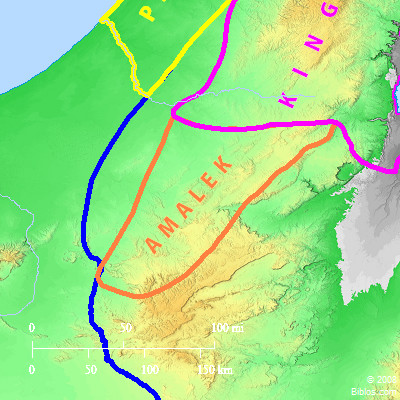Atlas  Amalek and surrounding area Maps Created using Biblemapper 3.0 Additional data from OpenBible.info You are free to use up to 50 Biblos coprighted maps (small or large) for your website or presentation. Please credit Biblos.com. Occurrences Numbers 24:20 He looked at Amalek, and took up his parable, and said, "Amalek was the first of the nations, But his latter end shall come to destruction."Deuteronomy 25:17 Remember what Amalek did to you by the way as you came forth out of Egypt; Deuteronomy 25:19 Therefore it shall be, when Yahweh your God has given you rest from all your enemies all around, in the land which Yahweh your God gives you for an inheritance to possess it, that you shall blot out the memory of Amalek from under the sky; you shall not forget. 1 Samuel 15:2 Thus says Yahweh of Armies,'I have marked that which Amalek did to Israel, how he set himself against him in the way, when he came up out of Egypt. 1 Samuel 15:3 Now go and strike Amalek, and utterly destroy all that they have, and don't spare them; but kill both man and woman, infant and suckling, ox and sheep, camel and donkey.'" 1 Samuel 15:5 Saul came to the city of Amalek, and laid wait in the valley. 1 Samuel 15:20 Saul said to Samuel, "But I have obeyed the voice of Yahweh, and have gone the way which Yahweh sent me, and have brought Agag the king of Amalek, and have utterly destroyed the Amalekites. 1 Samuel 28:18 Because you didn't obey the voice of Yahweh, and didn't execute his fierce wrath on Amalek, therefore Yahweh has done this thing to you this day. 2 Samuel 8:12 of Syria, and of Moab, and of the children of Ammon, and of the Philistines, and of Amalek, and of the spoil of Hadadezer, son of Rehob, king of Zobah. 1 Chronicles 18:11 These also did king David dedicate to Yahweh, with the silver and the gold that he carried away from all the nations; from Edom, and from Moab, and from the children of Ammon, and from the Philistines, and from Amalek. Encyclopedia AMALEK; AMALEKITEam'-a-lek, a-mal'-e-kit, am'-a-lek-it (`amaleq, `amaleqi): A tribe dwelling originally in the region south of Judah, the wilderness of et-Tih where the Israelites came into conflict with them. They were nomads as a people dwelling in that tract would naturally be. When they joined the Midianites to invade Israel they came "with their cattle and their tents" (Judges 6:3-5). They are not to be identified with the descendants of Esau (Genesis 36:12, 16) because they are mentioned earlier, in the account of the invasion of Chedorlaomer (Genesis 14:7) and in Balaam's prophecy (Numbers 24:20) Amalek is called "the first of the nations," which seems to refer to an early existence. We are uncertain of their origin, for they do not appear in the list of nations found in Genesis 10. They do not seem to have had any relationship with the tribes of Israel, save as, we may surmise, some of the descendants of Esau were incorporated into the tribe. It is probable that they were of Semitic stock though we have no proof of it. |



